BS”D 
Weiss Halivni Wine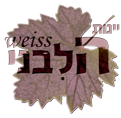
We are a small, family-oriented business that can produce up to 2000 bottles per year. Our motto is to produce high-quality red wine using only ecological-friendly, natural methods. Our vineyards grow in the most holy parts of Israel, in the southern-Hevron Hills, where our Jewish forefathers lived and died. We believe that this holiness is imparted into those who happily drink our wine.
The Vineyards
![grape2-[Converted]](http://english.weisshalivniwine.com/wp-content/uploads/2015/02/grape2-Converted.png) ♥ Establishment of the vineyard
♥ Establishment of the vineyard
Weiss-HaLivni Cellars was established in two stages:
(1) The original planting of the vineyard in 5764 (2004), and (2) The building of the winery itself which was completed in 5768 (2008). Because we make wine from our own vineyards (Estate Winery), our emphasis is on quality as opposed to quantity.
♥ Weiss Vineyard story HaLivni
Our main vineyard is located on the desert frontier of the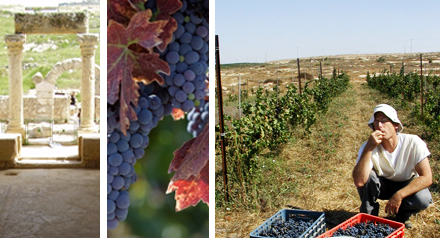
southern Hevron Hills at an elevation of 800 meters above sea level. Temperature variations are extreme which is a positive factor for quality vines. The mother-rock in the area is the Judea Formation consisting of limestone and marly-limestone. The border between bedrock and soil is distinct, and the soil thickness is relatively shallow. Soils in the area are defined as rendzina, characteristic of clayey-carbonate rocks, with good drainage and rich in organic matter. These soils have low water-availabiity. Our working of the land is the first by Jewish people in 2000 years.
♥ We are happy to show the winery to visitors and groups of up to 20 people with prior reservation.
Our grapes
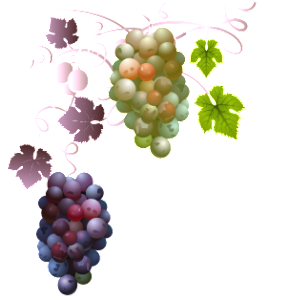 All of our vines are of the Merlot variety, originally from France. Merlot comes from the same family as Cabernet-Sauvignon, however it is characterized by an earlier ripening of fruit, a more “fruity” flavor and higher sugar content (i.e. higher alcohol potential). The color of the merlot wine is deep-purple.
All of our vines are of the Merlot variety, originally from France. Merlot comes from the same family as Cabernet-Sauvignon, however it is characterized by an earlier ripening of fruit, a more “fruity” flavor and higher sugar content (i.e. higher alcohol potential). The color of the merlot wine is deep-purple.
♥ Organic vineyard growth
We grow our vines without any pesticides or herbicides. Our motto is “minimal intervention” with consideration of the natural processes that can enhance the ecological system.
For instance, it is well-known that cover crops are an essential part of an organic vineyard that can enrich the soil with organic material and inhibit soil loss. However, because we are growing according to the strict agricultural laws of Israel set-out in the Torah, cover crops in a vineyard are prohibited. Therefore, we utilize a process where tilling the land is minimalized and natural foliage is allowed to grow amongst the vines. In addition, we add natural compost to the fields each year from the local husbandry businesses in the Hevron Hills.
♥ Growing method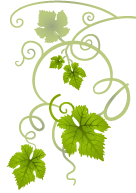
From our experience, higher wine quality is directly related to minimizing the available water for vine-uptake. Endless studies have been performed with many technologies designed for specific water applications during the growing season. We apply the most minimal amount of water to our vines according to a schedule that is in fine-tune with the daily temperatures surrounding the week. Our goal is to force the vines to “suck” hard so that all of the essential minerals are drawn from the ground and like children we “educate them according to their specific way”. Average rainfall in the area is approximately 350 mm per year. When we have above-average rainfall we decrease the watering schedule even more.
♥ The Harvest
 Regarding the optimal time for harvesting, there are many opinions. An early harvest is thought to preserve the natural “acidities” of the wine and the fine flavors, as well as increase ageing potential. A later harvest is thought to promote a thicker texture due to over-ripening of the fruit. You are welcome to view on our site here, the yearly harvest dates for each of our vintages as well as the sugar levels in the field just prior to each harvest.
Regarding the optimal time for harvesting, there are many opinions. An early harvest is thought to preserve the natural “acidities” of the wine and the fine flavors, as well as increase ageing potential. A later harvest is thought to promote a thicker texture due to over-ripening of the fruit. You are welcome to view on our site here, the yearly harvest dates for each of our vintages as well as the sugar levels in the field just prior to each harvest.
In truth, our harvesting dates are anyway imminently set around our holiday schedule (Rosh HaShana, Yom Kippur and Sukkot) which invariantly occur during this time of year. The holidays in essence predetermine our most optimum harvest dates.
We are proud to say that every bit of work at our vineyard , from the original planting, through the yearly pruning, and till the harvest, is done by only G-d fearing religious Jews. We believe that the redemption of the land must be done through the hard work of our people alone, and G-d willing, this will be a merit for the final redemption of the world.
♥ The Winery
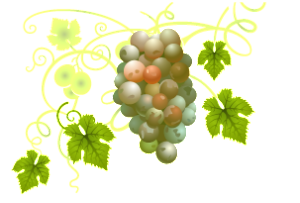 As noted, we are a relatively small winery (maximum 2000 bottles per year) located in Susya, a mere kilometer from the vineyards. We believe that it is critical to begin the wine-making process (crushing the grapes) soon-after they are removed from the vines. Our professional equipment includes a grape crusher and press, as well as stainless steel and glass containers. As opposed to large-producers, we believe that producing wine in non-porous containers (non-wooden) is an advantage. By doing so, we completely eliminate the need for harsh chemical detergents which are detrimental to our environment. Most importantly, by using only non-porous vessels, that we meticulously sterilize, we eliminate the need for adding preservatives/anti-oxidents such as sodium bisulfite after primary fermentation. In order to give our wine the familiar “wood flavor” from barrels, we add sterilized wood chips during fermentation.
As noted, we are a relatively small winery (maximum 2000 bottles per year) located in Susya, a mere kilometer from the vineyards. We believe that it is critical to begin the wine-making process (crushing the grapes) soon-after they are removed from the vines. Our professional equipment includes a grape crusher and press, as well as stainless steel and glass containers. As opposed to large-producers, we believe that producing wine in non-porous containers (non-wooden) is an advantage. By doing so, we completely eliminate the need for harsh chemical detergents which are detrimental to our environment. Most importantly, by using only non-porous vessels, that we meticulously sterilize, we eliminate the need for adding preservatives/anti-oxidents such as sodium bisulfite after primary fermentation. In order to give our wine the familiar “wood flavor” from barrels, we add sterilized wood chips during fermentation.

♥ Kashrut
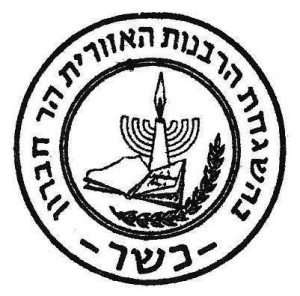 Our wine is under the strict kosher supervision of Rabbi Eliezar Altshuler, the Rabbi of the settlement of Susya as well as the Har Hevron Religious Council. We are strict regarding all of the various aspects of wine production, from the Israeli field to the bottle. In particular, regarding Ma’aser Rishon we actually give the portion to the Levi, in accordance to the strict opinions. The wine is non-cooked, and as noted above only G-d fearing, religious Jews are in contact with the grapes and the wine. This is in contrast to those opinions which allow non-Jews to be involved in the harvest. During the Shmitta Year, we will be producing wine with k’dushat shvi’it, in order to provide people with the opportunity to consume the fruits of Israel during this special year. We will do so by relinquishing ownership of the land, and working as employees of the Beit Din of Gush Etzion under the additional supervision of Rabbi Shmuel Zeiderman. Wine produced during this year will be clearly marked as Kedushat Shvi’it.
Our wine is under the strict kosher supervision of Rabbi Eliezar Altshuler, the Rabbi of the settlement of Susya as well as the Har Hevron Religious Council. We are strict regarding all of the various aspects of wine production, from the Israeli field to the bottle. In particular, regarding Ma’aser Rishon we actually give the portion to the Levi, in accordance to the strict opinions. The wine is non-cooked, and as noted above only G-d fearing, religious Jews are in contact with the grapes and the wine. This is in contrast to those opinions which allow non-Jews to be involved in the harvest. During the Shmitta Year, we will be producing wine with k’dushat shvi’it, in order to provide people with the opportunity to consume the fruits of Israel during this special year. We will do so by relinquishing ownership of the land, and working as employees of the Beit Din of Gush Etzion under the additional supervision of Rabbi Shmuel Zeiderman. Wine produced during this year will be clearly marked as Kedushat Shvi’it.
The Kashrut of the wine applies to all pertinent mizvot, including the four cups required on Passover.

♥ The Vineyard in Netiv Avot
Beginning in 5771 (2011) we began producing quality, natural wine from our friend’s vineyard in the settlement of Netiv Avot in Gush Etzion. Meni Gertler, grows his merlot vineyard in strict accordance to our high standards of no herbicides or pesticides, and Jewish-labor only. The vineyard was planted in memory of Emanuel Yehuda Moreno and Ezra Asher, of blessed memory, who were killed in Lebanon. The vineyard is relatively small (approximately 3 dunams) which allows for the grapes to be brought to the winery on the same day of the harvest. Wine produced from Netiv Avot vineyard is kept separate from the Susya wine, and is clearly defined on the lable.
